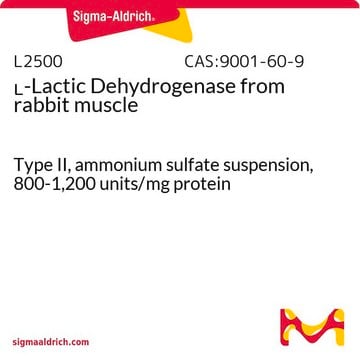C1622
Cyclohexanone Monooxygenase from Acinetobacter sp.
≥12 U/mL, ammonium sulfate suspension, recombinant, expressed in E. coli
Sign Into View Organizational & Contract Pricing
All Photos(1)
About This Item
CAS Number:
Enzyme Commission number:
MDL number:
UNSPSC Code:
12352204
NACRES:
NA.54
Recommended Products
recombinant
expressed in E. coli
Quality Level
form
ammonium sulfate suspension
concentration
≥12 U/mL
storage temp.
−20°C
Looking for similar products? Visit Product Comparison Guide
Application
Cyclohexanone monooxygenase has been used in a study that cloned and overexpressed the 2-oxo-Δ(3)-4,5,5-trimethylcyclopentenylacetyl-CoA monooxygenase (OTEMO) in Escherichia coli. Cyclohexanone monooxygenase has also been used in a study that investigated the effects of structural modification of the cell wall on the biotransformation capability by recombinant Corynebacterium glutamicum cells.
Biochem/physiol Actions
Purified cyclohexanone monooxygenase has a molecular weight of 59,000 Da. It is a versatile oxygenation catalyst. The enzyme uses the bound FAD-4a-OOH oxygenating intermediate to initiate transfer of oxygen to electrophilic substrate sites. The reaction consequently yields the corresponding sulfoxide and selenoxide products. This enzyme is also capable of oxygenating at nitrogen, trivalent phosphorus, and boron sites in boronic acids. Hence, it is one of the most broad-based flavoprotein oxygenases known.
Unit Definition
1 unit corresponds to the amount of enzyme which catalyzes the cyclohexanone-stimulated oxidation of 1 μmol of NADPH per minute at pH 9.0 and 30 °C
Physical form
Suspension in 80% saturated ammonium sulfate, 20 mM K-Na-phosphate buffer pH 7, 3.5 mM 1,4-Dithioerythritol (DTE)
signalword
Danger
hcodes
pcodes
Hazard Classifications
Resp. Sens. 1
Storage Class
11 - Combustible Solids
wgk_germany
WGK 1
flash_point_f
Not applicable
flash_point_c
Not applicable
Certificates of Analysis (COA)
Search for Certificates of Analysis (COA) by entering the products Lot/Batch Number. Lot and Batch Numbers can be found on a product’s label following the words ‘Lot’ or ‘Batch’.
Already Own This Product?
Find documentation for the products that you have recently purchased in the Document Library.
Y C Chen et al.
Journal of bacteriology, 170(2), 781-789 (1988-02-01)
The gene coding for cyclohexanone monooxygenase from Acinetobacter sp. strain NCIB 9871 was isolated by immunological screening methods. We located and determined the nucleotide sequence of the gene. The structural gene is 1,626 nucleotides long and codes for a polypeptide
Hannes Leisch et al.
Applied and environmental microbiology, 78(7), 2200-2212 (2012-01-24)
A dimeric Baeyer-Villiger monooxygenase (BVMO) catalyzing the lactonization of 2-oxo-Δ(3)-4,5,5-trimethylcyclopentenylacetyl-coenzyme A (CoA), a key intermediate in the metabolism of camphor by Pseudomonas putida ATCC 17453, had been initially characterized in 1983 by Ougham and coworkers (H. J. Ougham, D. G.
D Sheng et al.
Biochemistry, 40(37), 11156-11167 (2001-09-12)
Cyclohexanone monooxygenase (CHMO), a bacterial flavoenzyme, carries out an oxygen insertion reaction on cyclohexanone to form a seven-membered cyclic product, epsilon-caprolactone. The reaction catalyzed involves the four-electron reduction of O2 at the expense of a two-electron oxidation of NADPH and
Iakov Polyak et al.
Journal of the American Chemical Society, 134(5), 2732-2741 (2012-01-14)
We report a combined quantum mechanical/molecular mechanical (QM/MM) study on the mechanism of the enzymatic Baeyer-Villiger reaction catalyzed by cyclohexanone monooxygenase (CHMO). In QM/MM geometry optimizations and reaction path calculations, density functional theory (B3LYP/TZVP) is used to describe the QM
Ji-Yeong Yun et al.
Bioprocess and biosystems engineering, 35(1-2), 211-216 (2011-09-13)
The effects of structural modification of cell wall on the biotransformation capability by recombinant Corynebacterium glutamicum cells, expressing the chnB gene encoding cyclohexanone monooxygenase of Acinetobacter calcoaceticus NCIMB 9871, were investigated. Baeyer-Villiger oxygenation of 2-(2'-acetoxyethyl) cyclohexanone (MW 170 Da) into
Articles
Instructions for working with enzymes supplied as ammonium sulfate suspensions
Our team of scientists has experience in all areas of research including Life Science, Material Science, Chemical Synthesis, Chromatography, Analytical and many others.
Contact Technical Service









